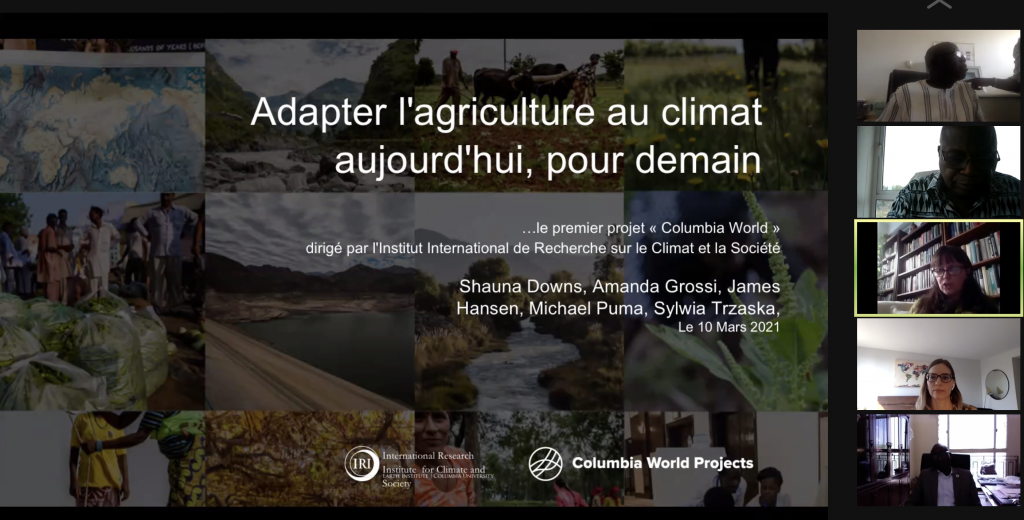Beyond Food Security: ACToday Addressing Climate-Nutrition Linkages in Senegal
The Adapting Agriculture to Climate Today, for Tomorrow (ACToday) Columbia World Project is working with Senegal’s Cheikh Anta Diop University (UCAD), home to the country’s largest master’s and doctoral training programs, to address one of the most under-researched topics in development: the links between climate and nutrition.
In March, ACToday-Senegal hosted an online event that brought together more than 100 students, academics, policy makers, and development practitioners from Senegal and West Africa to discuss the topic and identify opportunities for research, training and collaborations.
The issue is particularly salient for West Africa, which already has one of the highest burdens of malnutrition in the world. Climate change is expected to make the situation worse, leading not only to decreased crop yields and livestock productivity, but also to changes in food quality–diversity, nutrient density and safety–as well as spikes in food prices.
One of the people crucial to connecting the ACToday project in Senegal with nutrition experts has been Misbath Daouda, a doctoral student at Columbia’s Mailman School of Public Health who studies energy and public health and completed an ACToday internship in 2020. Daouda set out to investigate how climate information and services are currently being used to inform nutrition-specific and sensitive interventions (see aside) in Senegal and how they could inform the delivery of such interventions in the future. In doing so, she interviewed stakeholders in the nutrition sector about their use and needs relating to climate information. Among them was UCAD’s Human Food and Nutrition Laboratory (LARNAH), which has now become a key partner and champion for ACToday-Senegal’s strategy to improve research, capacity building, and tools to address these issues.
“What became clear to me over the course of these interviews was the gap that exists between the research that was being done on nutrition in Senegal and those doing climate work who might want to use that research,” Daouda says. “Although the respondents could point to changes in agricultural production that they attributed to climate change, they were unfamiliar with the potential use of forecasts, environmental monitoring, and other types of climate services. Some of them could envision the relevance and potential benefit of climate services to their organization’s work, but were so eager to learn more.”
In other words, while many people knew or believed that climate was impacting nutrition and their work, exactly how it was doing so wasn’t clear. Part of the problem is due to the reality that Senegal-specific research on this topic is limited. One such study to document and elucidate such pathways was recently completed by the ACToday Senegal team. And another issue relates to a need to build foundational knowledge on what climate is, and tools to help understand and analyze it.

This was the motivation behind the three-hour online event in March, says Amanda Grossi, ACToday-Senegal’s country manager. Her team worked closely with UCAD-LARNAH’s director, Nicole Dossou, to organize an event that not only fostered discussion about climate-nutrition linkages, but also helped participants understand the fundamentals of climate and climate-nutrition pathways on a conceptual level, and presented concrete examples of tools already available through Senegal’s national meteorological service, ANACIM, that might be tailored for the nutrition community.
“The webinar was an important call to action on this issue,” says Grossi.“We expected 40 people, but more than 110 showed up for the event, and not just from Senegal but from across West Africa. This is clearly a conversation people are ready to have and shows it’s high time to move beyond discussing climate impacts on food security to including nutritional outcomes.”

The ACToday-Senegal team is starting an official collaboration with UCAD-LARNAH to 1) ensure the integration of climate-related topics into UCAD’s Masters in Human Nutrition curriculum and doctoral seminar series, 2) promote joint tool development and tailoring of climate information and services for the nutrition community with ANACIM, UCAD, and the National Committee for the Development of Nutrition (CNDN), and 3) foster joint research between students of Columbia University, Rutgers University, and UCAD on climate-nutrition related topics.
“The webinar was just a first step to open up many other doors and avenues of collaboration between those working in climate and nutrition, including and especially project managers. Addressing these issues is critical for our future,” says Dossou.
Involving the UCAD community in Senegal, especially through the design of new curricula, lays the foundation for long-term progress, even after the ACToday project ends, says Grossi.

You must be logged in to post a comment.